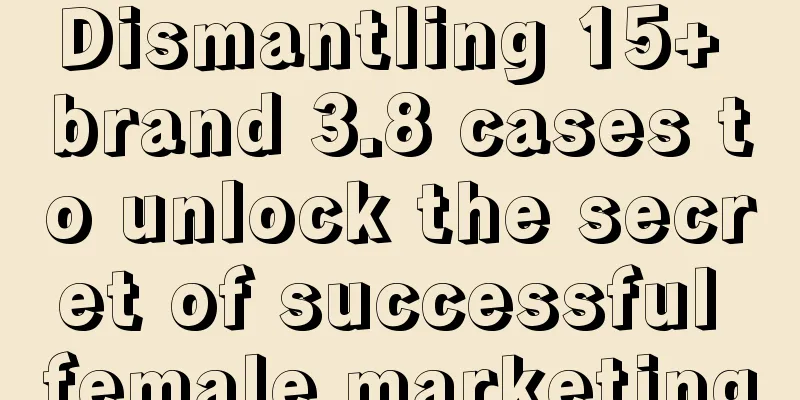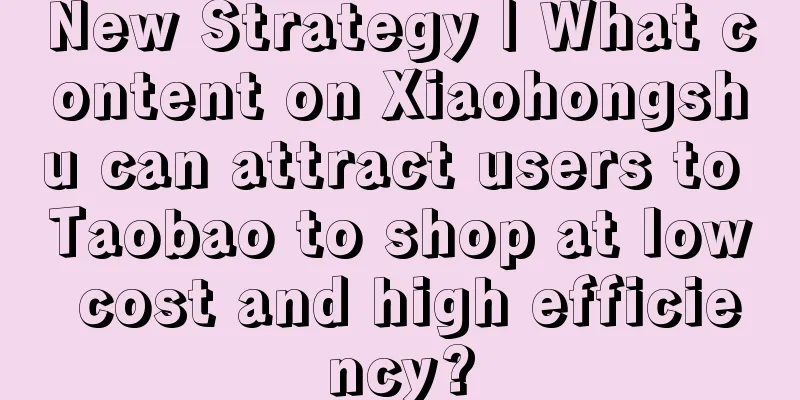Dismantling 15+ brand 3.8 cases to unlock the secret of successful female marketing

Last year on Women's Day, PROYA fell from grace due to its forced implantation of a male perspective. This year, Coca-Cola has repeatedly jumped around in the stereotype of "parents cooking"; The brands’ clumsiness in dealing with gender issues exposes the deep dilemma of marketing to women: When social concepts are in a period of tearing apart from the old and the new, how can we avoid losing our voice or losing our footing? In 2025, the answer to the question seems to be gradually becoming clear. Adolf uses the scent of shampoo to fight against secular discipline, Durex breaks taboos with an 8-minute conversation on sex, and L'Oreal uses "imperfect narratives" to dispel anxiety... These cases also reveal new rules for marketing to women: Real female marketing is not about playing the safe card of avoiding controversy, but about using commercial power to expand the boundaries of thought. Only when a brand dares to turn its commercials into a conceptual scalpel can it be truly favored by the market. 01 Single concept leads to failure? How can an advertising film be new and not make mistakes?With the development of feminism in recent years, brands are no longer the same as before in the design of advertising films, and have begun to advocate liberalism and diversified aesthetics. Feminism will truly win when society no longer asks “why doesn’t she get married/have children” but respects “how she chooses to live”. Feminism requires freedom, not templatesTherefore, if you want to avoid making mistakes in advertising films that focus more on spiritual output and brand building, the first thing you need to do is to respect women’s right to free choice. This is also Adolf's core idea. On Women's Day, Adolf published the trilogy "When You Are With Yourself, You Don't Hear the Truth". It simulates three scenarios: being urged to get married by Internet comments, being attacked by gender discrimination in the workplace, and being kidnapped by the identity of a mother. The heroine is troubled by these malicious words from others and is overwhelmed and at a loss. These comments from the outside world seem to be the result of a formula, always assuming that every woman will follow the same trajectory in her life, and that there is only one way to live and one answer to life. Just when the heroine was depressed, Adolf stood up and told her, "These are all wrong, don't pay attention to these words." With the fragrance of Adolf's shampoo, the heroine had a chance to have a deep conversation with her heart. She finally understood that the only thing that is really important is to follow your heart and be your true self. It is important to be "fragrant" with yourself. Adolf not only spoke out the girls' voices through the commercials, but also gave them spiritual comfort; at the same time, he cleverly integrated the characteristics of his own shampoo into the advertisements as a vehicle for dialogue with the soul, thus killing two birds with one stone. Durex also chose the path of "free choice" this year. It released the advertising film "We take the initiative, more possibilities" on Women's Day this year, hoping to explore the topic of "When the topic of sex becomes more popular, can women have more active choices?" The commercial invited guests such as Olga, Wu Zheng Da Piaopiao, and Cai Jiayin, who used 8 minutes to share their discussions on love and desire, the exploration of women's body and mind, and the practice of intimate relationships through three chapters: "Active Expression", "Active Exploration" and "Active Practice". Durex's move is very bold. On the one hand, most people are still at the stage of being afraid to talk about sex. On the other hand, in such fragmented time, it takes courage for a brand to use 8 minutes of dialogue as the main form of advertising, because many people will not be able to bear it. However, the effect after the release was exceptionally good. Not only did the number of likes on multiple platforms steadily increase, but the comments section also recognized that Durex was able to discuss sexual topics. Although it seems to be talking about "sex", Jissbon is actually talking about the topic of "women should have the right to choose freely". It hopes that through active exploration, active expression and active practice, women can be free from the constraints of traditional old concepts and be free to take responsibility for their own pleasure. As society becomes more open to sexual topics, women are no longer passive recipients, but are able to actively express their needs and pursue pleasure. With the support of products and technologies, this expression not only enhances women's status in gender relations, but also promotes society's recognition of women's sexual needs. At the same time, Durex certainly did not forget to advertise its own products, so at the end of each chapter, they transformed the bloggers' speeches into "sexual relationships." Humanistic care is still the focus of female advertisementsHumanistic care has always been one of the main themes of brand advertising. When humanistic care is integrated into female marketing, brands need to grasp the real pain points of women when making advertisements, state the real difficulties of women, and be a "companion" instead of a preacher. Caring for women starts with listening to their silence. The unspoken grievances are often heavier than accusations. That’s exactly what L’Oréal Paris did: This year, L'Oréal released the advertising film "It's OK, Every Step Is Worth It", inviting five women, Xiao Lu, Ye Shiwen, Yang Tianzhen, Li Sisi and Teng Congcong, to talk about the setbacks they faced and their mentality after facing setbacks based on their real experiences, thus conveying the concept of "letting go of anxiety". L'Oreal conveyed through the advertisement that we should not be too hard on ourselves and should not be too anxious. Even if we want to become a heroine and become more perfect, it doesn't matter if we are not perfect, because there is no wasted journey in life and every step is worth it. What is particularly noteworthy is that at the end of the film, L'Oréal also began to widely accept stories from consumers, listen to their stories, and see every step they take. L'Oréal has changed the concept of "worthiness" from a result-oriented standard of success to a respect for process-based experience, breaking the society's norms of "perfection" on women and giving positive meaning to lows. Through real stories rather than slogan-style propaganda, the brand uses Women's Day as a starting point to elevate beauty marketing to the level of social value advocacy, strengthens the image of "companion" rather than "preacher", and focuses on caring for women. L'Oreal's commercial does not have too many product elements, but focuses more on brand building and meaning communication. Ubras and Kisscat also care about women, but they start from the product. The advertising film "Not Only Visible to Her" released by Ubras on Women's Day in 2025 focuses more concretely on the "invisible dilemma" of women in their daily lives. It’s the underwear hem that keeps rising; it’s the air conditioning temperature in the shopping mall that is too low; it’s the headrests of the seats that are always higher than the head; and it’s the bathroom that always has long queues. Only when these problems that are always ignored in daily life are solved one by one, life will start to get better. Although it is difficult to change everything at once, it is easy to start with underwear, and finally return the advertising film to underwear, that is, Ubras' products. It is not only an insight into the pain points of the product, but also a deep empathy for the plight of women. It elevates the comfort of underwear to the level of women's self-care and body autonomy, and conveys the brand proposition of "freeing the body first". Kisscat, a women's footwear and hat brand from the same school as Ubras, released the campaign "She Knows Your Discomfort" on Women's Day, which also combines its own products with the perspective of caring for women. It simulated the troubles that most women encounter in daily life because of high heels, such as easy loss of balance and lack of breathability, and at the same time said that the technology of its own products can effectively resolve these current problems. First, from society to values, and then from values to products. This sublimation shows the brand's deep understanding of women's needs and its active response to women's health care. But as a brand that also sells underwear, Aimu Underwear’s planning this year has been a complete failure. Aimu's "Antifragile Design" released this year was also criticized by netizens. In fact, they originally wanted to make a "female protagonist" script, encouraging people to become stronger after experiencing pain, and put forward the idea of "anti-fragility". However, the details of the advertisement are too many. The most criticized part is the childbirth plot. On the one hand, the advertisement attributes the pain of childbirth to "fragility"; on the other hand, the advertisement uses "painful and joyful" to describe childbirth, which is too bizarre. Many netizens also responded in the comment section that "no one wants to have another child." In addition, the brand's comments and interactions are also quite surprising. They use "anti-tear", "anti-pressure" and "anti-boredom" as selling points for their underwear. But in fact, as underwear, as long as it is comfortable, it is enough. Making some unnecessary selling points makes people doubt their motives. Experience the inner core, the power of women must be seenIf the humanistic care mentioned above is a softer emotional expression, then brands also need to pay attention to more resilient emotional outbursts to express female power, which can be both a tenacious spirit and an optimistic attitude. In the advertising film "Then, Come Again!" released by Zhan Meiya on Women's Day in 2025, the real stories of voice actor Lv Yanting and skit actor Wang Gege were used to show the resilience and regenerative power of women in the face of setbacks. The advertising film, with the theme of "Energy Creates Energy", conveys the spirit of women's fearless challenges and continuous breakthroughs in the workplace and in life. The film mentions: "There is no such thing as perfect success. It's just the light polished out by countless 'clicks' and 're-recordings'." This sentence not only reveals the difficulties faced by women in their pursuit of success, but also encourages them to bravely say "try again" when facing difficulties. It not only touched the audience emotionally, but also demonstrated the brand concept of Zhan Meiya at the technological level. Its PDRN energy bar product is the practical embodiment of this energy concept, providing support and strength to women through technological means. It encourages women to constantly draw energy and reshape themselves when facing challenges in life and the workplace. This spirit is deeply in line with the brand concept of Zhan Meiya, which not only conveys the core value of the brand, but also brings spiritual encouragement and strength to female consumers. Lululemon's Women's Day campaign this year is so vibrant that it overflows the screen. In their "Live Actively" commercial, the story of 78-year-old fitness expert Joan MacDonald conveys the positive attitude towards life that "it's never too late to live actively." At the age of 70, Joan was troubled by chronic diseases and began to change her lifestyle, focusing on healthy eating and regular exercise. Now she has become a fitness expert who inspires millions of fans. "Live Alive" is not only an advertisement, but also a celebration of a positive attitude towards life. It encourages people of all ages to rediscover their passion and vitality in life through exercise and a healthy lifestyle. When brands no longer view feminism as a standard answer to marketing exams, but actually listen to the monologues that are drowned out by disciplinary voices, commercial narratives will have the power to shake up prejudices. From Adolf’s “self-consistent fragrance” to Durex’s proactive exploration, from L’Oréal’s embrace of “imperfection” to Lululemon’s silver-haired models’ declaration of vitality - these cases all say: true women’s freedom is not to tear off labels and replace them with new shackles, but to allow roses and thorns to coexist, so that each of them can see her unpruned self in the commercial mirror. 02 Offline planning, online interaction, and making visible female storiesWhether it is collaboration or exhibition, the key to offline planning is interaction and experienceIn addition to commercials, this year's brand has also put a lot of effort into planning online and offline activities. Libresse Weier's "Moonlight is Open" theme exhibition is a public welfare exhibition focusing on the issue of women's menstruation. The exhibition will last from February 22 to March 9 and will be held at the COCOPark Phase 2 Jingzai Art Museum in Futian District, Shenzhen. The exhibition breaks the concept of menstrual shame, emphasizes the power of women, and calls on society to pay attention to women's menstrual rights through the display of art works, popular science knowledge and interactive experience. The exhibition exhibits works by many female artists, and has a menstrual history and popular science area, as well as interactive projects such as DIY menstrual theme accessories. Shanghai Auntie’s Women’s Day project adopted a joint venture format. Shanghai Auntie launched a special joint event on Women's Day in 2025, choosing to cross-border cooperate with the most influential female artist of the 20th century, the legendary Mexican painter Frida Kahlo. The joint event is themed "Thorns and Roses", integrating Frida's iconic strong aesthetics into tea design and brand narrative. For example, the limited edition drink "Flower of Life" is based on dragon fruit and roselle tea, and topped with edible flowers, echoing the bright colors and natural elements often seen in Frida Kahlo's paintings; the packaging replicates her classic self-portrait, combined with a winding vine pattern, which is a metaphor for the vitality of women blooming in adversity. The brand uses Frida Kahlo's legendary life to transform tea into a vehicle for women to express themselves. Frida experienced physical trauma but reconstructed herself through art, which is in line with the demands of contemporary women to break through social discipline and accept their true selves, sublimating consumption behavior into a tribute to the spirit of tenacity. By transforming Frida Kahlo's traditional Mexican clothing elements and surreal imagery into the visual language of tea drinks, Shanghai Auntie not only continues its own positioning of "new Chinese aesthetics", but also breaks the boundaries between art and daily life with cross-cultural narratives, allowing the issue of women's power to be more universally disseminated. Brand voice, consumer interaction, online community explosion requires resonanceNot only offline, but also in online communities, brands have come up with many creative ideas. Hansu launched a special project "We Support Ourselves" on International Women's Day in 2025. It takes the homophonic pun "women=us" as the core and combines emotional resonance with product strength to demonstrate the brand's deep thinking on women's issues. The event focuses on the social pressures faced by contemporary women, such as "appearance anxiety" and "age anxiety", and invites female representatives from various fields such as Zhao Jinmai, Rosamund Kwan, and Liu Xiaoqing to interpret women's power with "confidence" in different dimensions and build a spirit of mutual assistance of "girls helping girls". The biggest highlight of Hansu's online planning this time is the use of the concept of "support". On the one hand, it reflects the diversity of female power through the star matrix, breaks the traditional gender framework, and "supports" the connotation of women; on the other hand, it corresponds to its own "Man Yao" series of products, realizing the transformation from the inside out. In addition to Hansu, Perfect Diary's online plan this year is a continuation of the stories of previous years. On Women's Day in 2024, Perfect Diary went viral with the commercial "Ambition", praising all women who have contributed to the promotion of women's development and social development. This year is a continuation of "ambition", and we begin to focus on the ordinary and tenacious women around us and listen to their extraordinary stories of ambition. As long as you post your "ambition story" with relevant topics in the comment section of various media, you will have a chance to win 380 lipsticks prepared by Perfect Diary. Currently, when you open the comment sections of Perfect Diary’s Xiaohongshu, official account, etc., you can see that many female consumers have bravely told their stories, which has also attracted a lot of resonance. Online release, offline synchronization, double exposureThe above article talked about how to create topics online and how to be seen by more people offline. In fact, many brands have begun to integrate online and offline resources and vigorously launched Women's Day advertisements. Marubi’s integrated marketing on Women’s Day was particularly outstanding. First, on the eve of International Women's Day, Marubi officially announced Yang Zi as the first global brand spokesperson, and then launched a series of marketing activities with "pinning yourself" as the core theme. First, a "Top Female" values TVC starring Yang Zi was released online, and then collaboration was carried out with female stars with "female lead" personalities such as Ge Xi; later, an in-depth dialogue on the awakening of women's self-worth was constructed offline through various forms such as large-screen advertisements in cities. MaruMei's combination of attacks mainly focused on two key points. The first is the precise resonance between the personality and the brand proposition. Yang Zi's public image as a "highly qualified heroine" is highly consistent with Marubi's value of "putting oneself on top", transforming the technological power of the anti-aging cream into a metaphor for women's spiritual growth. The second is to move from traffic marketing to social issues. The brand not only touches emotional pain points through highly resonant copywriting such as "Put Yourself at the Top of the Life Dialog Box", but also rises to a higher dimension of women's issues. The marketing battlefield for Women's Day in 2025 has changed from one-way communication to a more comprehensive one. Brands have increased online and offline discussions through three main means: art collaboration, charity exhibitions, and community co-creation. Whether it is Shanghai Auntie sublimating tea into a spiritual totem with Frida Kahlo's thorny aesthetics, or Libresse tearing open the silent curtain of menstrual taboos with the "Moonlight Openness" exhibition. This actually shows that female marketing is no longer limited to "saying the right words", but through action implementation, the brand role has changed from "bystander of the issue" to "real companion." 03 Don’t avoid it. The key to marketing to women is freedom.Even though there are still many good ideas this year, looking back, many brands that were once happy to do Women's Day marketing have not made any moves this year. This may also be closely related to the sensitivity of women's issues in the marketing field. It is difficult for brands to carry out marketing on Women's Day while balancing gender equality. Coca-Cola was even more embarrassed by the gender balance. First, it released an ad with "Dad in the Kitchen" which was criticized by netizens as "unrealistic". A few days later, Coca-Cola released another ad with "Mom in the Kitchen" to make up for it. It thought it could save its reputation, but it was criticized again because netizens thought Coca-Cola's behavior was a bit stereotypical. Coca-Cola really has to say that it is too difficult. It can’t be a father or a mother. In fact, the current dilemma of feminist marketing is due to the transition of gender relations. The traditional gender order has loosened, but there is no clear new consensus. Brands caught in the middle will inevitably face a wavering position. Some brands think that as long as they don’t touch it, they won’t be affected. But in fact, when controversy emerges, it is also a good opportunity for brands to seize the market opportunity. As long as the brand makes it clear that women's freedom is not about being disciplined and "correct", but about giving every woman the right to choose without being defined, it will not touch the red line. Specifically, we need to understand it from three aspects: First, we must respect women’s diverse choices. The underlying logic of female marketing should be based on recognizing and accepting the differences within the female group. It cannot start from a fixed female template, but should serve differentiated groups. This requires brands to reserve space for women in different situations in their narratives, not to make comparisons between full-time housewives and career elites, or to differentiate between women with children and those without children. Marketing should avoid judging or guiding women’s choices, but instead show respect and understanding for different choices. Second, it is to challenge social prejudice and break stereotypes. Feminist marketing should have the courage to challenge social concepts that are restrictive and biased against women and break traditional gender stereotypes. For example, a subway poster of Didi two days ago was praised to the sky. In fact, if you only look at the form of expression, it is very ordinary, just showing the smiling faces of Didi drivers. But what is special is that the stereotype of "driver" has always referred to male drivers, and Didi deliberately showed a number of female drivers in the poster. At the same time, they do not have the criticized aesthetic of white, young and thin, but only reflect the real expressions of ordinary people, making their smiles particularly penetrating. By demonstrating women's leadership in the workplace, their versatility in the family, and their active participation in society, women can be made aware of their own value and potential and no longer be bound by traditional role positioning. Third, it is to provide more substantial support and empowerment Brands should not only support women's free choice in terms of concepts, but also provide help and support to women in practical actions. Marketing that only stays at the "slogan" stage is outdated. For example, they can provide high-quality products and services to meet the actual needs of women in their pursuit of freedom. Like Deyou, which specially prepared a "pregnant mother charity package" for all "pregnant mothers" on Women's Day last year. It’s not just about shouting slogans, but about making every woman feel the brand’s care and support for them, so that we can truly become a “female-friendly” brand. 04 Conclusion
The famous quotes written by Alexandre Dumas are also worth remembering by the advertising industry. Even though there seems to be a fixed formula for marketing products to women, it is far from enough to just apply the formula to your own products in order to win the favor of the "she" economy. Only by respecting women, abandoning traditional stereotypes about women, and putting yourself in their shoes and considering their needs, can you truly create advertisements that impress the market. By Eric |
<<: From "brainwashing hits" to IPO: What did Mixue Bingcheng do right in its brand marketing?
>>: The creativity of amateurs is limited. How to avoid homogeneity when expanding the market?
Recommend
Without working for ten years, you can’t come up with such a touching marketing case.
This article covers the actual operations of many ...
Taobao Live can no longer sit still as it becomes an MCN
In recent years, live streaming has become very po...
Amazon will update the logistics process of creating shipments
Amazon Global Selling announced that the "Sen...
What computer is best for Amazon? Are there any requirements for the computer?
There are two ways to register for Amazon. One is ...
Sticking to the “big V” route, how much commercial imagination does Weibo’s KOL ecosystem have?
In the digital age, the influence of social media ...
How to pay for Amazon shopping? Is it reliable to buy things on Amazon?
Amazon is one of the world's largest e-commerc...
Dong Yuhui is the "spiritual successor" to Yu Minhong
The transformation of Oriental Selection and Dong ...
Is it good to have only one product in cross-border e-commerce? How to list products?
In the cross-border e-commerce industry, choosing ...
Is there any bonus for playing Douyin PK for five minutes? What is the maximum score you can get in PK?
As one of the most popular short video platforms i...
How to list products on Shopee Philippines? How to do it?
Shopee currently has many sites in different count...
Why did Yeti become a globally popular internet celebrity water cup instead of engaging in internet celebrity marketing?
In today's era of the Internet celebrity econo...
What are adult products on Amazon? What are the situations where they are labeled as adult products?
When opening a store on Amazon, people usually cho...
How to register PayPal in China? Do I need to register in Hong Kong?
Paypal has three account types: personal account, ...
Can Amazon reserved inventory be sold? What does reserved inventory mean?
For sellers who sell goods on the Amazon platform,...
Alibaba's ChatGPT "Tongyi Qianwen" is officially announced! Tmall Genie and DingTalk's new features are revealed
At the 2023 Alibaba Cloud Summit, Zhou Jingren, CT...









